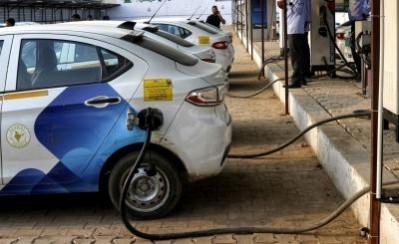Electric vehicle (EV) players on Wednesday welcomed the government's decision to defer the implementation of stringent EV battery testing standards, saying it will help Indian battery makers redesign batteries and introduce safe vehicles on the roads.
The Ministry of Road Transport and Highways has deferred the tough EV battery standards (AIS-156 and AIS-038) that were formulated after several battery fires reported in the first six months of the year, shaking customers' trust in EV two-wheelers.
Dr Akshay Singhal, Founder and CEO of Log9 Materials, said that the deferment in the implementation of the EV battery standards and the government's latest decision to roll-out the regulations in phases is "most welcome from the industry perspective".

"This move will ensure adequate diligence is done before the revived generation of batteries arrives to the Indian consumers," he added.
Alarmed at battery fire episodes, the Ministry had constituted a committee of experts to suggest safety standards for batteries, battery components and related systems.
Kalyan C. Korimerla, Managing Director, Etrio said that this will ensure that Indian battery makers can be thorough in redesigning the batteries, certification agencies have ample time to gear up for increased testing mandates, and "at the same time, vehicle OEMs now have enough time to introduce vehicles using these new batteries into the market in a safe manner and to get their vehicles re-certified".
An Ola Electric spokesperson said that the company is fully aligned and supportive of new standards based on the AIS 156 amendment.
"We also urge the industry peers to commit to meeting the amended regulations within the effective date of implementation. These norms are ahead of most current international standards and regulations, and will make India a world leader in EVs and cells, while accelerating our country's and world's transition to electric mobility," said the company spokesperson.

















